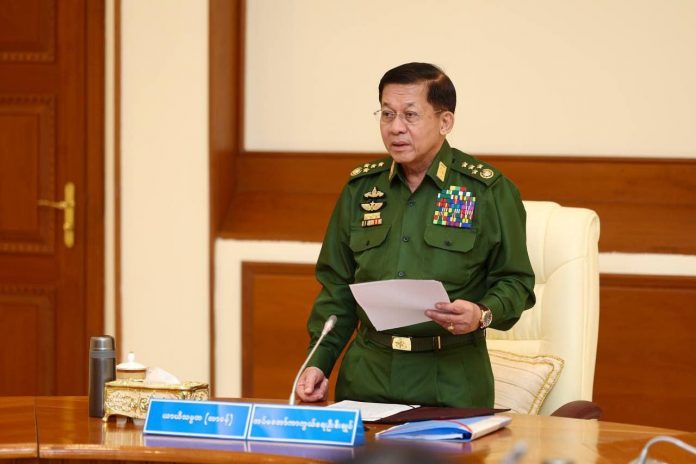Guest contributor
Myo Yan Naung Thein
The capture of the Northeast Regional Military Command (RMC) by the Myanmar National Democratic Alliance Army (MNDAA) represents a significant setback for the military. Following this development, Senior General Min Aung Hlaing delivered a speech characterized by shock and irrationality.
Despite having access to significant state resources, he attributed the fall of the RMC to the superior drones and weapons of the anti-coup resistance forces, which had acquired less advanced equipment through public donations.
In his address to the nation, Min Aung Hlaing sought to shift responsibility to the Ethnic Resistance Organizations (EROs) and the People’s Defense Forces (PDFs), accusing them of receiving foreign support while ignoring his own shortcomings.
His rambling and illogical rhetoric only served to highlight his own inadequacies and lack of strategic thinking the military’s dependence on attributing blame, employing fear-based tactics, and implementing oppressive measures has expedited its decline, with the MNDAA successful seizure of the RMC underscoring the escalating challenges and resistance confronting the military regime in Naypyidaw.
The military organized a protest against the MNDAA takeover of the RMC, coercing government employees to participate and commandeering passenger buses for the demonstration. This coercive tactic highlights the military’s limitations. In a retaliatory move following the MNDAA’s seizure of the RMC, the military bombed the Kutkai market in northern Shan State, resulting in civilian casualties and the destruction of the market.
This violent response underscores the military’s lack of a coherent strategy beyond instilling fear and brutality in both short-term and long-term actions, showcasing their inhumanity and absence of effective planning.
The military regime is trapped in its own mindset, cut off from alternative ways of thinking. Throughout Myanmar’s history since independence in 1948, fear has been the only tool for their control of power, and it appears that they’ve become reliant on it. They seem to feel comfortable with their strategy of instilling fear.
They have become so accustomed to exercising control through intimidation that they don’t know what to do when that strategy begins to fail. Feeling lost and unable to consider alternatives, they resort to what they know best, using brutality and fear to maintain their grip on power. It’s a troubling cycle that doesn’t offer a way forward.
The root of the military’s failure lies in their mindset. They conceal their own irrationalities while shifting blame onto others. Their mindset is dominated by fear, brutality, and oppression, they create an environment where no one dares to oppose them, leaving them with no viable way forward.
The deliberate actions of the military resulted in not only setbacks on the battlefield but also significant economic failures. Their mismanagement led to soaring prices for everyday commodities like cooking oil and rice. In response, they blamed businessmen for the price hikes and proceeded to arrest them.
Although this crackdown caused a temporary dip in commody prices like cooking oil and rice, within a week, prices surged to uncontrollable levels. The initial drop in prices following the arrests prompted traders to stop selling these products altogether. Consequently, a black market for essential goods emerged, where basic food items were sold in secret.
The U.S dollar trading market experienced a similar trajectory. By the end of March 2024, the exchange rate was 3,780 kyat for $1 USD, which increased to 3,900 kyat by the end of April. By the end of May, the rate had climbed to 4,250 kyat, and by the end of June, it reached 4,450 kyat. During this period, the military blamed the rising USD prices on businessmen, leading to their arrests. As a result, by the end of July, the exchange rate surged to 5,300 kyat per USD.
This is how the military addresses issues: through crackdowns and instilling fear. That is what motivates them to bomb the civilians of Kutkai market. If questioned about why they targeted a market bustling with civilians, they would likely respond that Kutkai city is under MNDAA control, and the residents must live in fear.
However, if asked what outcome they expect from instilling fear in civilians, they would be unable to provide a clear answer. For generations, they have relied on fear as their tactic, yet there is no definitive strategy behind it. Despite using fear as a means of control, their approach lacks a coherent vision of its intended results.
The mindset of Min Aung Hlaing and his military regime has ensnared it in a cycle of blame, fear, and intimidation. His approach reveals an inherent failure of leadership. As the situation deteriorates, he clings more tightly to these tactics, which only accelerates the downfall of the military. This reliance on fear leads to increasingly uncontrollable mistakes, ultimately resulting in a chaotic collapse.
Consequently, the end of the military may arrive much sooner than the public anticipates.
Myo Yan Naung Thein is the visiting researcher and co-chair of the Burmese Democratic Futures Working Group , University of Virginia. In this capacity, he has traveled across the U.S. speaking to students, church groups, policymakers and members of the Myanmar diaspora community to build support for Myanmar’s democracy movement and the return of his country to civilian rule.
DVB publishes a diversity of opinions that does not reflect DVB editorial policy. We’d like to hear what you think about this or any of our stories: [email protected]



